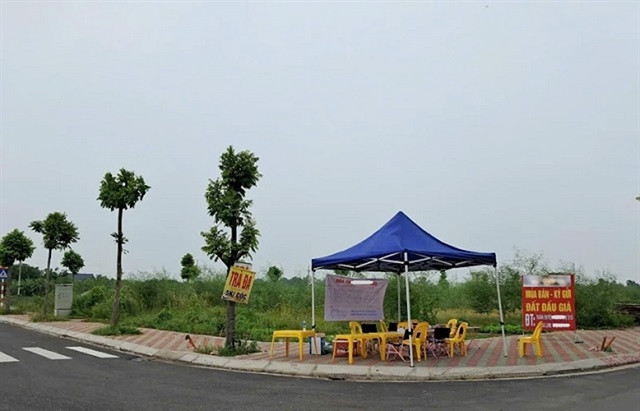 |
| A view of the auctioned land plots in Thanh Thần Hamlet, Thanh Cao Commune, Thanh Oai District, on August 13. — VNA/VNS Photo |
Hà Nội's land market is experiencing a surge in activity, fuelled by the recent implementation of new real estate laws and investor confidence.
A recent land auction in Thanh Oai District, where prices soared multifold higher than the starting bids, has raised concerns about potential price bubbles in the market.
About 2,000 bidders showed up at the auction, bidding on 68 land plots in Thanh Thần Hamlet, Thanh Cao Commune, Thanh Oai.
The bidding frenzy drove prices far beyond expectations, with final bids ranging from VNĐ63 million (US$2,500) to VNĐ100 million per sq.m, which is five to eight times the starting prices.
Such high prices might not be representative of the broader market as data from batdongsan.com.vn reveal that the typical listing price in Thanh Cao in Q2 was just VNĐ27 million per sq.m.
Even the highest recorded price over the past five years, VNĐ48 million per sq.m, pale in comparison to the auction's results.
Investors and brokers have seized on these figures to justify price hikes across Hà Nội, raising concerns about a speculative bubble forming.
Experts believed Hà Nội's infrastructure investments and efforts to reduce inner-city congestion had contributed to the growing interest in suburban areas.
New urban developments with attractive amenities make these areas more appealing, leading to increased transactions and a greater willingness among residents to relocate.
However, they also warned that this trend could lead to a dangerous inflation of property prices in the city and land auctions could become a hotbed for speculation.
Nguyễn Văn Đính, Chairman of the Vietnam Association of Real Estate Brokers, said the suburban land segment in Hà Nội had picked up steam since the first half of 2024, but the increased activity does not necessarily indicate a healthy market because some areas are showing signs of price manipulation.
He advised homebuyers to exercise caution in such an environment.
Đỗ Thị Thu Hằng, Director of Savills Hanoi's Advisory Services, cited the implementation of the Land Law, Housing Law and Real Estate Business Law on August as a turning point for Hà Nội's land market as they are expected to address long-standing issues and lead to a new cycle in the market.
She also cited the issue of tight supply as a key concern. When supply is restricted, choices are limited and prices tend to rise, but the laws are expected to improve supply, leading to a more stable market.
However, she cautioned that resolving the supply shortage will take time as many projects are still waiting for further guidance before they can proceed. While the laws offer a positive outlook, their full impact on the market remains to be seen.
Nguyễn Văn Đức, a real estate investor in Hà Nội, said the soaring prices in the auction had caught him off guard.
He noted that while the overall market had seen a rebound this year, investor speculation of a tighter supply under the new laws had triggered a rush to hoard properties, further driving up prices.
Experts said the current high prices in the market are impacting investment decisions and liquidity. However, with the entry into effect of the laws and the gradual issuance of guiding documents, there's hope for greater stability and benefits for the public.
The laws are expected to address several key issues, including limited supply, unapproved projects and regulations for selling future properties. They will also provide clarity on matters such as land use fees, land leases and social housing development.
The early enactment of these laws is expected to boost confidence among buyers and investors, helping them make more informed decisions.
For example, the Real Estate Business Law now limits sellers to collecting deposits of up to five per cent of the property value, and only when the project meets legal conditions for sale.
This protects buyers from potential fraud and allows them more time to prepare financially, fostering greater trust in the market.
While the full impact of these laws remains to be seen, they represent a significant step towards a more stable and transparent real estate market in Việt Nam. — VNS